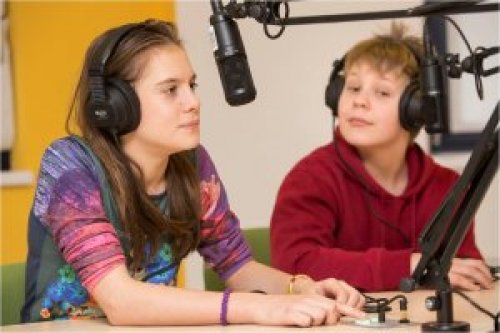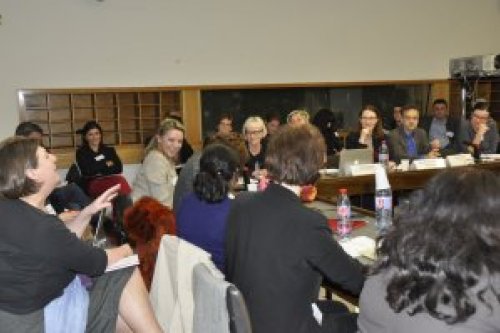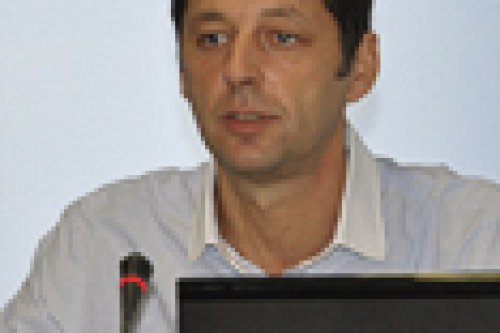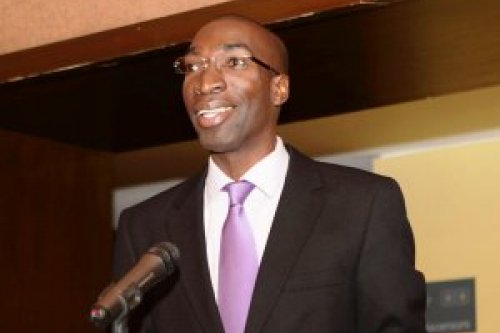


Languages
- Español
- English
Paris Declaration on Media and Information Literacy adopted
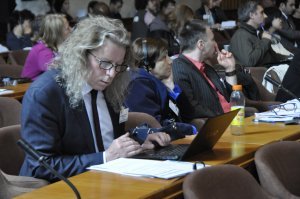
Participants adopted the Paris Declaration on MIL in the Digital Era during the first European Media and Information Literacy (MIL) Forum, which was held at UNESCO Headquarters in Paris from 27-28 May 2014. The Declaration reaffirms the importance of MIL and calls for a renewed emphasis on MIL in today's digital environment as well as cooperation among key actors and multi-stakeholder groups to advance MIL for all.
Persons who were present at the forum are invited to offer further comments by July 5, after which the Declaration becomes official and final. The MIL Forum was a product of international collaboration between UNESCO, the European Commission (EC), the Autonomous University of Barcelona and other partners, within the framework of the Global Alliance for Partnerships on Media and Information Literacy (GAPMIL).
The event brought together over 350 people from all over Europe and from over 15 countries outside of Europe. Participants included MIL experts, teachers, media, information and technology professionals, industry, schools, audio-visual authorities, media organizations, researchers, foundations, civil society organizations as well as political and regulatory authorities.
The Forum was designed to give momentum to national policies and strategies on MIL as a basis to support free, independent and pluralistic media as well as to enable citizens to effectively respond to issues of privacy, safety and ethics in the digital era.Stakeholders have identified challenges in establishing MIL policies in order to achieve these aims.
UNESCO's MIL Policy and Strategy Guidelines was recognized as a useful tool in the development of more sustained national policies and strategies. This comprehensive resource is the first of its kind to treat MIL as a composite concept. The role of technology was also emphasized by Mirta Lourenco, Chief of the Section for Media Development and Society, who opened the MIL Forum on behalf of UNESCO: "In the world we live today, driven by information and knowledge, the quest for peace, equality, intercultural dialogue and development are influenced by media and technology.
The role of technology was also emphasized by Mirta Lourenco, Chief of the Section for Media Development and Society, who opened the MIL Forum on behalf of UNESCO: "In the world we live today, driven by information and knowledge, the quest for peace, equality, intercultural dialogue and development are influenced by media and technology.
The explosion of technologies has led to a rethinking of citizens' engagement and participation. Online spaces and online media have become essential to women and men of all ages, and indispensable to young people and children." She called for media and information literacy for all citizens.
The European Commission representative Matteo Zacchetti echoed the sentiments when he inverted the theme of the first plenary session: New World, New Literacies, to say, "...we need new literacies to construct a new world.
"The two-day forum presented participants with the opportunity to attend several plenary and parallel sessions on topics including research on MIL and its relation to formal education, family and media, policy implications and intercultural/interreligious dialogue.

The findings of the European Media Education Research (EMEDUS)project were shared and will form the basis of follow-up on the implementation of MIL in Europe. EMEDUS offered recommendations to improve media education in European school curricula, informal education and education for disadvantaged groups.
These proposals were the result of research in 27 European countries. Professor Jose Manuel Pérez Tornero, Head of the Department of Journalism and Communication at the Autonomous University of Barcelona - the leader of this research initiative - quipped "Media [and information] literacy is not just a single objective.
It is a catalyst for bringing about innovation in education practices, communication, culture and politics. Media and information literacy will ultimately be a skill in education. Above all else, it will be an opportunity to renew learning and teaching."The final results of the European Cooperation in Science and Technology (COST) network and ANR TRANSLIT were also presented. The project evaluated the MIL profile of 29 countries across Europe.
It examined different dimensions of MIL including resources, policy frameworks, funding and training available in each country and evaluated the degree to which the dimension is already present or progressing. In addition to the discussion of the EMEDUS project recommendations and COST network results, a framework of an MIL social media strategy was prepared and presented.
The strategy enables people to advance their MIL competencies in ordinary, daily online experiences. UNESCO and partners are now working to develop and implement certain aspect of this strategy.The event also saw GAPMIL meet for the first time, with the steering committee agreeing on its terms of reference. An update will be shared with the GAPMIL community shortly.
During the final plenary session of the Forum, it was decided that the Forum would be held annually as a platform for the European Chapter of GAPMIL.The overall sentiments of participants are that the first European MIL Forum was a huge success. The quality of interventions both from presenters and the participants resulted in rich knowledge sharing.
As one participant noted, "...The conference was wonderful. MIL is on the cusp of a global breakthrough... it is certainly taking off internationally..."Building on the momentum of the European Forum, UNESCO, the National Autonomous University of Mexico and the Autonomous University of Barcelona have agreed to co-organize the first Latin America and Caribbean MIL Forum. This meeting will be held in Mexico from 10-11 December 2014.

